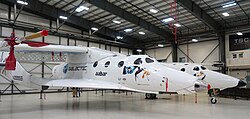VSS Enterprise crash

|
|
| Accident summary | |
|---|---|
| Date | October 31, 2014 |
| Summary | Inflight break-up, cause under investigation |
| Site | Mojave Desert, California, United States |
| Crew | 2 |
| Fatalities | 1 |
| Injuries (non-fatal) | 1 |
| Survivors | 1 |
| Aircraft type | Scaled Composites Model 339 SpaceShipTwo |
| Aircraft name | VSS Enterprise |
| Operator | Virgin Galactic |
| Registration | N339SS |
| Flight origin | Mojave Air and Space Port, California, United States |
| Destination | Mojave Air and Space Port |
On October 31, 2014, VSS Enterprise, a Virgin Galactic Scaled Composites Model 339 SpaceShipTwo experimental spaceflight test vehicle, suffered a catastrophic in-flight breakup and crashed in the Mojave Desert, California, United States while performing a test flight. The co-pilot, Michael Alsbury, was killed and the pilot, Peter Siebold, was seriously injured.
The vehicle in the accident, VSS Enterprise, registration N339SS, was the sole Scaled Composites Model 339 SpaceShipTwo test vehicle. It was the first of the five SpaceShipTwo craft planned by Virgin Galactic. Since October 2010, VSS Enterprise had flown 20 captive flights while remaining attached to its WhiteKnightTwo carrier aircraft, 31 unpowered glide-to-landing tests, and three rocket-powered test flights. There were several performance issues during the ship engine's development in 2012 and 2013.
A rocket-powered test flight of SpaceShipTwo took place on April 29, 2013, with an engine burn of 16 seconds duration. The brief flight began at an altitude of 47,000 feet (14,000 m), and reached a maximum altitude of 55,000 feet (17,000 m) and a speed of Mach 1.2 (920 miles per hour (1,480 km/h)).
In order to receive a Federal Aviation Administration license to carry passengers, the craft needs to complete test missions at full speed and 62 miles (100 km) altitude.
A second SS2 vehicle, VSS Unity, was rolled out in February 2016.
...
Wikipedia
